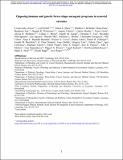Opposing immune and genetic mechanisms shape oncogenic programs in synovial sarcoma
Author(s)
Regev, Aviv
DownloadSubmitted version (31.69Mb)
Publisher Policy
Publisher Policy
Article is made available in accordance with the publisher's policy and may be subject to US copyright law. Please refer to the publisher's site for terms of use.
Terms of use
Metadata
Show full item recordAbstract
© 2021, The Author(s), under exclusive licence to Springer Nature America, Inc. Synovial sarcoma (SyS) is an aggressive neoplasm driven by the SS18–SSX fusion, and is characterized by low T cell infiltration. Here, we studied the cancer–immune interplay in SyS using an integrative approach that combines single-cell RNA sequencing (scRNA-seq), spatial profiling and genetic and pharmacological perturbations. scRNA-seq of 16,872 cells from 12 human SyS tumors uncovered a malignant subpopulation that marks immune-deprived niches in situ and is predictive of poor clinical outcomes in two independent cohorts. Functional analyses revealed that this malignant cell state is controlled by the SS18–SSX fusion, is repressed by cytokines secreted by macrophages and T cells, and can be synergistically targeted with a combination of HDAC and CDK4/CDK6 inhibitors. This drug combination enhanced malignant-cell immunogenicity in SyS models, leading to induced T cell reactivity and T cell–mediated killing. Our study provides a blueprint for investigating heterogeneity in fusion-driven malignancies and demonstrates an interplay between immune evasion and oncogenic processes that can be co-targeted in SyS and potentially in other malignancies.
Date issued
2021Department
Howard Hughes Medical Institute; Koch Institute for Integrative Cancer Research at MIT; Massachusetts Institute of Technology. Department of BiologyJournal
Nature Medicine
Publisher
Springer Science and Business Media LLC
